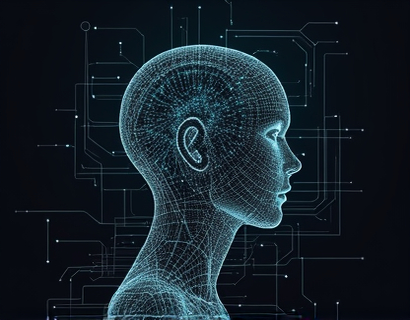Personalized AI Companions: Transforming Childhood Creativity and Emotional Well-Being with Interactive Digital Friends
In the digital age, technology has become an integral part of children's lives, offering new opportunities for learning, creativity, and emotional development. One of the most exciting advancements in this realm is the creation of personalized AI companions designed to interact with children in meaningful ways. These AI-driven imaginary friends are not just simple games or apps; they are sophisticated tools that can significantly enhance a child's creativity and emotional well-being. This article delves into how these digital companions are transforming the way children play, learn, and grow, providing a safe and enriching environment for their development.
The Rise of AI-Driven Imaginary Friends
The concept of AI companions for children is rooted in the growing understanding of how technology can be harnessed to support cognitive and emotional growth. Unlike traditional toys or games, AI companions can adapt to a child's unique personality, interests, and emotional needs. This personalization is key to fostering a deeper and more meaningful connection between the child and the digital companion. The technology behind these AI companions involves natural language processing, machine learning, and emotional intelligence algorithms, allowing the digital friend to understand and respond to the child's inputs in a way that feels natural and engaging.
Enhancing Creativity Through Interactive Play
One of the most significant benefits of AI companions is their ability to stimulate a child's creativity. Traditional play often involves imagination and creativity, but AI companions take this to a new level by providing interactive scenarios and prompts that encourage creative thinking. For example, a digital companion might suggest a story to build upon, introduce new characters, or propose challenges to solve. These interactions not only spark the child's imagination but also help develop narrative skills and problem-solving abilities. The AI's adaptability ensures that each play session is unique, keeping the child engaged and motivated to explore new creative paths.
Supporting Social Skills Development
Social skills are crucial for a child's emotional and social development, and AI companions can play a vital role in this area. These digital friends can engage in conversations, play games, and even role-play different social scenarios. By interacting with an AI companion, children can practice communication skills, learn to understand and express emotions, and develop empathy. The AI can be programmed to respond in various ways, simulating different social situations and helping children navigate complex social dynamics. This interactive approach provides a safe and controlled environment for children to experiment with social interactions, building confidence and competence.
Creating a Safe Digital Environment
Safety is a paramount concern for parents and guardians when it comes to children's use of technology. AI companions are designed with safety in mind, ensuring that the digital environment is secure and free from harmful content. The AI can monitor and filter interactions, preventing exposure to inappropriate material or interactions. Additionally, these companions can be set up with parental controls, allowing adults to manage the level of interaction and the types of activities the child can engage in. This level of control provides peace of mind for parents, knowing that their children are exploring and learning in a safe and supervised digital space.
Promoting Emotional Well-Being
Emotional well-being is as important as cognitive development, and AI companions can contribute significantly to this aspect of a child's growth. These digital friends can recognize and respond to a child's emotions, offering support and comfort when needed. For instance, if a child expresses feelings of sadness or frustration, the AI can provide reassurance, suggest coping strategies, or engage in activities designed to uplift the child's mood. This emotional support can be particularly beneficial for children who may struggle to express their feelings or find it difficult to connect with peers. The AI's consistent and non-judgmental presence can help children feel understood and valued, fostering a positive self-image and emotional resilience.
Fostering Imaginative Play
Imaginative play is a fundamental aspect of childhood development, crucial for cognitive, social, and emotional growth. AI companions excel in this area by providing endless possibilities for imaginative scenarios. Whether it's creating a fantasy world, solving puzzles, or engaging in role-play, the AI can adapt to the child's ideas and expand upon them. This dynamic interaction not only enhances creativity but also helps children develop critical thinking and innovation skills. The AI's ability to generate new and exciting elements keeps the play experience fresh and engaging, encouraging children to think outside the box and explore their creative potential.
Encouraging Independent Learning
AI companions can also serve as educational tools, supporting independent learning and curiosity. By presenting information in an interactive and engaging manner, these digital friends can help children learn new concepts and skills at their own pace. For example, an AI companion might introduce a child to a new subject, such as science or history, through storytelling or interactive quizzes. The AI can adjust the difficulty level based on the child's progress, ensuring that the learning experience is both challenging and rewarding. This personalized approach to education can boost a child's confidence and motivation to learn, making education a more enjoyable and effective process.
Building Emotional Intelligence
Emotional intelligence is a critical skill for success in both personal and professional life. AI companions can play a significant role in developing this skill by helping children understand and manage their emotions. Through interactive conversations and scenarios, the AI can teach children to identify and label their emotions, understand the emotions of others, and develop appropriate responses. This emotional awareness is essential for building healthy relationships and navigating social situations. The AI's consistent and supportive presence can provide a safe space for children to explore and practice these important skills.
Enhancing Parent-Child Interaction
While AI companions offer valuable support and companionship, they also have the potential to enhance the relationship between children and their parents or guardians. By providing a shared digital experience, AI companions can serve as a bridge, encouraging parents to engage more actively in their child's digital activities. Parents can participate in the child's play sessions, asking questions, offering guidance, and sharing in the fun. This shared experience can strengthen the parent-child bond and provide opportunities for meaningful conversations about the child's thoughts, feelings, and experiences.
Addressing Potential Concerns
Despite the numerous benefits, there are valid concerns about the use of AI companions in children's lives. One common worry is the potential for over-reliance on technology, which could hinder face-to-face social interactions. However, when used thoughtfully and in moderation, AI companions can complement traditional play and social activities rather than replace them. Another concern is the risk of children forming attachments to digital entities at the expense of real-world relationships. To mitigate this, it is essential for parents to maintain a balanced approach, ensuring that AI companions are one part of a diverse and enriching childhood experience.
Conclusion
The integration of personalized AI companions into children's lives represents a significant leap forward in supporting creativity and emotional well-being. These digital friends offer a unique blend of interactivity, personalization, and safety, providing a rich and supportive environment for children to grow and thrive. By enhancing imaginative play, fostering social skills, and promoting emotional intelligence, AI companions are transforming the way children learn and develop. As technology continues to evolve, the potential for these AI companions to positively impact childhood is vast, offering a promising future for both children and their caregivers.











































